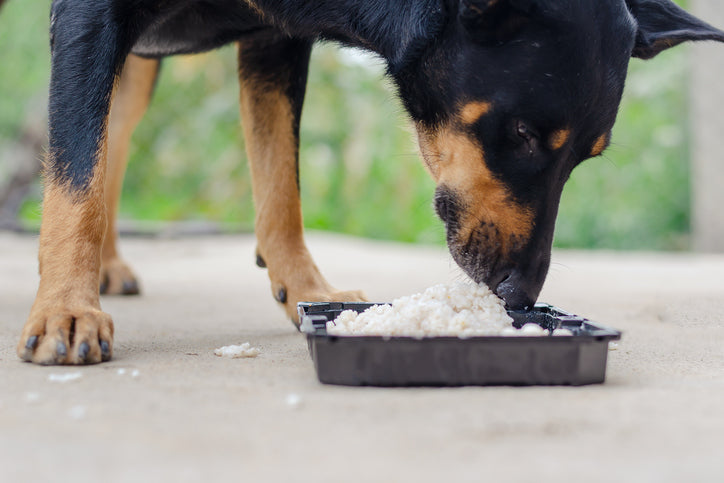
Indian Foods That You Can Safely Feed Your Dog
|
|
Time to read 4 min
|
|
Time to read 4 min
When you’re sitting down to eat a warm plate of rice, dal, or chapati, it’s natural for your dog to come wagging its tail, hoping for a bite. But as responsible pet parents, the question arises: “Which Indian foods are safe for my dog?”
The good news is that many foods from a typical Indian kitchen can be shared with dogs, provided they are prepared simply — without salt, oil, masala, or ghee. Feeding the right foods can improve your dog’s digestion, immunity, coat health, and overall happiness.
This guide will walk you through Indian staples, vegetables, fruits, proteins, and foods to avoid so you can make informed choices for your furry friend.
Why it’s good: Rice is a gentle carbohydrate that provides quick energy and is easy on your dog’s stomach. It’s commonly recommended when dogs have diarrhea or digestive issues.
How to feed:
Boiled white rice for sick dogs.
Brown rice in small amounts for healthy dogs as it contains fiber.
Tip: Mix rice with boiled chicken, curd, or dal to make it balanced.
Benefits: Natural probiotics help maintain gut health, reduce stomach upsets, and provide calcium for strong bones. It also cools the body in hot Indian summers.
How to feed: A spoonful of plain curd with rice, or serve chilled on hot days.
Avoid: Sweetened or flavored yogurt that contains sugar/artificial sweeteners.
Why it’s good: Whole wheat chapati is a source of carbohydrates and fiber.
How to feed: Small, plain pieces of chapati without ghee, butter, or salt. Pair with dal or curd.
Caution: Some dogs have wheat allergies — watch for itching or loose stools.
Nutrition: Excellent vegetarian source of protein and fiber.
Best choices: Moong dal and masoor dal are light and easy to digest.
How to feed: Well-cooked, watery dal with rice. Avoid tadka, spices, or onions.
Avoid: Rajma and chana dal in large amounts as they can cause gas.
Indian kitchens have an abundance of seasonal vegetables, many of which can benefit dogs.
Carrots (Gajar): Great for teeth health and rich in Vitamin A.
Pumpkin (Kaddu): A natural remedy for constipation and diarrhea.
Sweet Potato (Shakarkandi): Provides energy and dietary fiber.
Bottle Gourd (Lauki): Low calorie, good for overweight dogs.
Spinach (Palak): High in iron and antioxidants.
Beans: Source of plant protein and fiber.
How to feed: Steam or boil the vegetables, chop them into small pieces, and mix with rice or chicken.
Vegetables to avoid: Onion, garlic, brinjal (eggplant), and spicy chilies.
Fruits make excellent treats — natural, hydrating, and packed with vitamins.
Banana: Potassium-rich and good for digestion.
Papaya: Helps digestion and keeps the tummy clean.
Apple: Great source of fiber and Vitamin C (remove seeds).
Watermelon/Musk Melon: Hydrating summer treats.
Mango: Sweet and vitamin-rich, but remove skin and seed.
Fruits to avoid: Grapes, raisins, custard apple (seeds toxic), and jackfruit (hard to digest).
Packed with protein, vitamins, and fatty acids.
How to feed: Boiled or scrambled (no masala).
Tip: Even eggshell powder (finely ground) can be added for extra calcium.
A staple protein for Indian dogs.
Best preparation: Boiled or lightly cooked, boneless, without skin or spices.
Good for: Muscle development, coat health.
Varieties like rohu, pomfret, or sardines (well-cooked and deboned) are safe.
Rich in Omega-3 fatty acids for skin and joint health.
Avoid: Fried or spicy fish curries.
Coconut water: Hydrating and rich in electrolytes.
Coconut flesh: Improves digestion and boosts skin/coat health.
Tip: Give in moderation to avoid loose stools.
Some Indian foods can be dangerous or toxic:
Spicy curries, fried food, oily gravies
Onions and garlic (common in Indian tadkas)
Sweets like gulab jamun, jalebi, halwa (sugar and ghee overload)
Grapes and raisins (toxic to kidneys)
Chocolates, biscuits, and packaged namkeen
Excess salt and masala
Always cook plain — no masala, onion, or garlic.
Introduce new foods slowly and in small quantities.
Watch for allergies (itching, vomiting, loose stools).
Balance homemade food with high-quality dog food for complete nutrition.
Keep treats (fruits, chapati bits) within 10% of daily calories.
Q: Can my dog eat rice daily?
Yes, plain rice with protein (chicken, dal, or curd) is safe and filling.
Q: Is milk safe for dogs?
Most Indian dogs are lactose intolerant. Instead of milk, offer curd.
Q: Can I give ghee to my dog?
A drop occasionally is fine, but avoid excess as it causes obesity.
Q: Are Indian street foods safe for dogs?
No — fried and spicy foods (like samosas, bhajji, pani puri) are harmful.
Q: Can puppies eat Indian food?
Yes, but in softer, smaller portions — rice with curd, mashed dal, and boiled chicken are good starters.
Indian kitchens are filled with healthy, dog-friendly foods. From rice and curd to chapati, dal, veggies, fruits, eggs, and chicken, you can craft simple meals for your pet. The key is to keep it plain, spice-free, and balanced.
At NativFarm, we believe in natural, wholesome nutrition rooted in our culture. By combining safe homemade foods with nutritionally complete pet food, you can give your dog the best of both worlds — taste and health.